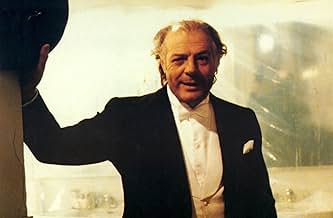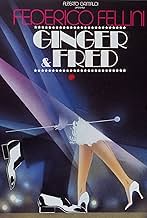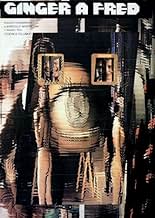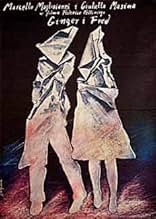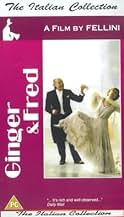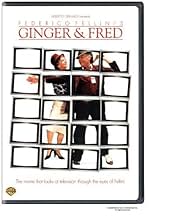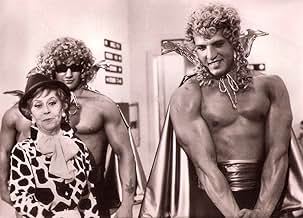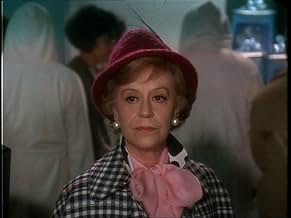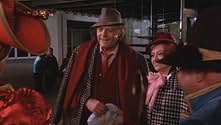CALIFICACIÓN DE IMDb
7.2/10
5.8 k
TU CALIFICACIÓN
Amelia y Pippo se reencuentran después de varias décadas para realizar su antiguo acto musical en un programa de televisión.Amelia y Pippo se reencuentran después de varias décadas para realizar su antiguo acto musical en un programa de televisión.Amelia y Pippo se reencuentran después de varias décadas para realizar su antiguo acto musical en un programa de televisión.
- Dirección
- Guionistas
- Elenco
- Nominada a1 premio BAFTA
- 18 premios ganados y 18 nominaciones en total
Friedrich von Ledebur
- Admiral Aulenti
- (as Frederick Ledebur)
Jacques Henri Lartigue
- Brother Gerolamo
- (as Jacques Henry Lartigue)
Totò Mignone
- Totò
- (as Toto Mignone)
Antoine Saint-John
- Bandaged man
- (as Antoine Saint Jean)
Friedrich von Thun
- Kidnapped Industrialist
- (as Frederich Thun)
Antonino Iuorio
- Production Inspector
- (as Antonio Iuorio)
Opiniones destacadas
Fellini takes a stab at television in this wonderful satire. It's Christmas, and an Italian "Ed Sullivan" type show is having a special, by re-uniting acts that were featured years ago. There is a hilarious (for those in the know) swipe at Woody Allen, who has been parodying Fellini for years. It's a bit deliberately paced, but the chemistry between the stars makes it worthwhile.
Federico Fellini is one of the greatest directors and screenwriters the world has ever seen...and that must be the biggest understatement of the century. He had the ability to take simple, real elements and transform them into a surreal, enchanting experience that speaks for itself without the aid of a complicated plot or a multi-million dollar production design (although that's not to say his films aren't visually breath-taking). Even though it's not one of his greatest masterpieces, "Ginger e Fred" is one such film that demonstrates his never-ending talent.
The main plot is as simple as it gets. Amelia and Pippo (Giulietta Masina and Marcello Mastroianni) are old friends who haven't seen each other for years, and in their youth, they were reasonably famous for their imitation of Ginger Rogers and Fred Astaire, doing their classic tap dancing and glamorous choreographies. Now, they're very old, but they're being invited by a big (and sleazy) TV station to perform in their epic Christmas program reenacting their age-old act. The film is about these two old people, seeing each other after so many years, and remembering those golden years when they were celebrated, important, and had the spark of love and friendship alive for each other.
They're not the only ones invited to the show, though. A huge cast of quirky and colourful characters also make their appearance, each one trying to grab their share of the spotlight performing sometimes interesting, sometimes plain stupid, acts and/or abilities and "amazing" stories. We see an (obviously) Fellini-esquire array of supporting freaks- the priest who renounced his vows to marry his lover, the monk who levitates, the singing slovenly dwarfs, Swedish townsfolk with their fifteen-tit cow, a transsexual who services an entire prison row and is being processed for it, a medium who listens to ghosts through a tape recorder...the list is endless. They all have odious, over-familiar dialogue which makes us relate to the grotesque things we think well of in life. Our heroes, Amelia and Pippo, are thrown in with this collection of freaks, and find themselves both hating and liking the situation they've accepted.
The images the film presents are as unusual and as surreal as we have come to experience through other Fellini films. The dialogue sounds casual and witty, but is continually spiked with longing, electricity, loathing and disenchantment. Our main characters speak and travel this (seemingly) alternate world they've entered and find it horrifyingly equal to that they live in. The way they all try to hog the spotlight, their unnatural addiction to TV and celebrities, the way they're all brainwashed through the televised images...Fellini makes a point on all of these. He also continually presents TV commercials about pork and meat, each commercial bearing a scantly-clad woman with a gruesome piece of meat and proclaiming it to be utterly delicious. The people believe it. We also see various posters and written advertisements with strange and slightly disturbing images for a variety of products that don't work, and proclaiming nothing but lies. People believe them.
We see two main characters, Amelia and Pippo, being likable characters trying to relive their friendship, trying to regain their previous vitality and trying to fit in with a series of "freaks" (in every sense of the word) in a world where greed, money, fame and awful manners have been allowed to run rampant. We see our main characters trying to quit their association with this distasteful universe only to be drawn in over and over again by a faint memory of fame, by an interlude with someone famous, by the expectations their friends have of them.
We, as the audience, feel happy to relate to these old friends who have met once again, and feel their angst. We also feel a certain repugnant hate for the rest of the characters, unfeeling beasts who (to our surprise and chagrin) also seem, each in their own way, very similar to us and the people that surround us. And what is all the more interesting is the way Fellini never even delves into the personalities of these characters (with the exception of Amelia and Pippo) but indirectly spends every second of the film injecting meaning and objection into them. The images, of course, speak for themselves.
Masina and Mastroianni are perfect in their roles, the music is both catchy and nostalgic, the costumes are...well, out of this world and the screenplay is both earthbound and ethereal. I couldn't understand the emotional implications of the ending, but I suppose that must be Fellini's point, to leave the audience thinking. And, believe me, this movie does get you thinking! And though it's definitely not one of Fellini's greatest, it still is entertaining and amusing to analyze.
Rating: 3 stars and a half out of 4!
The main plot is as simple as it gets. Amelia and Pippo (Giulietta Masina and Marcello Mastroianni) are old friends who haven't seen each other for years, and in their youth, they were reasonably famous for their imitation of Ginger Rogers and Fred Astaire, doing their classic tap dancing and glamorous choreographies. Now, they're very old, but they're being invited by a big (and sleazy) TV station to perform in their epic Christmas program reenacting their age-old act. The film is about these two old people, seeing each other after so many years, and remembering those golden years when they were celebrated, important, and had the spark of love and friendship alive for each other.
They're not the only ones invited to the show, though. A huge cast of quirky and colourful characters also make their appearance, each one trying to grab their share of the spotlight performing sometimes interesting, sometimes plain stupid, acts and/or abilities and "amazing" stories. We see an (obviously) Fellini-esquire array of supporting freaks- the priest who renounced his vows to marry his lover, the monk who levitates, the singing slovenly dwarfs, Swedish townsfolk with their fifteen-tit cow, a transsexual who services an entire prison row and is being processed for it, a medium who listens to ghosts through a tape recorder...the list is endless. They all have odious, over-familiar dialogue which makes us relate to the grotesque things we think well of in life. Our heroes, Amelia and Pippo, are thrown in with this collection of freaks, and find themselves both hating and liking the situation they've accepted.
The images the film presents are as unusual and as surreal as we have come to experience through other Fellini films. The dialogue sounds casual and witty, but is continually spiked with longing, electricity, loathing and disenchantment. Our main characters speak and travel this (seemingly) alternate world they've entered and find it horrifyingly equal to that they live in. The way they all try to hog the spotlight, their unnatural addiction to TV and celebrities, the way they're all brainwashed through the televised images...Fellini makes a point on all of these. He also continually presents TV commercials about pork and meat, each commercial bearing a scantly-clad woman with a gruesome piece of meat and proclaiming it to be utterly delicious. The people believe it. We also see various posters and written advertisements with strange and slightly disturbing images for a variety of products that don't work, and proclaiming nothing but lies. People believe them.
We see two main characters, Amelia and Pippo, being likable characters trying to relive their friendship, trying to regain their previous vitality and trying to fit in with a series of "freaks" (in every sense of the word) in a world where greed, money, fame and awful manners have been allowed to run rampant. We see our main characters trying to quit their association with this distasteful universe only to be drawn in over and over again by a faint memory of fame, by an interlude with someone famous, by the expectations their friends have of them.
We, as the audience, feel happy to relate to these old friends who have met once again, and feel their angst. We also feel a certain repugnant hate for the rest of the characters, unfeeling beasts who (to our surprise and chagrin) also seem, each in their own way, very similar to us and the people that surround us. And what is all the more interesting is the way Fellini never even delves into the personalities of these characters (with the exception of Amelia and Pippo) but indirectly spends every second of the film injecting meaning and objection into them. The images, of course, speak for themselves.
Masina and Mastroianni are perfect in their roles, the music is both catchy and nostalgic, the costumes are...well, out of this world and the screenplay is both earthbound and ethereal. I couldn't understand the emotional implications of the ending, but I suppose that must be Fellini's point, to leave the audience thinking. And, believe me, this movie does get you thinking! And though it's definitely not one of Fellini's greatest, it still is entertaining and amusing to analyze.
Rating: 3 stars and a half out of 4!
10cwitt
Ginger e Fred is much more a film about the Italian psyche than a film about an old dance team that reunites after 40 years to appear on a TV variety show. It takes place at Christmastime, and having spent Christmas in Rome, the fun-insane carnival atmosphere Fellini depicts is pretty accurate, but exaggerated for film. Walking around Rome I found subconscious playing back bits of the soundtrack and it was only then that I realized how much I love this film. It's also about people who time leave behind. And about two people who are tragically unable to say how much they do love each other. It's also very very funny. Fellini go the idea for the film after seeing his older films butchered on Italian TV. A highlight is an old woman who was paid not to watch TV for a month. She's brought into the studio a mental wreck, swearing she'll never do it again and promises to watch more and more TV.
10jhclues
Memories are time capsules kept within every one of us, stored in the mind, but activated by the heart; the indelible images and sensations that make up an individual's life. A heartbeat away, they can be opened at any time, but let the bearer beware, for often they are bittersweet at best. `Ginger and Fred,' directed by Federico Fellini, and starring Giulietta Masina and Marcello Mastroianni, brings two people back together after nearly thirty years apart, a reunion of the professional dance team who for fifteen years prior to their retirement imitated Ginger Rogers and Fred Astaire to the delight of audiences all over Europe. Now, all these years later, they are to dance together again; this time on the popular television show, `We Are Proud To Present,' a `tabloid' type show which presents a variety of acts and guests weekly for the perusal of their curious audience. And so, amid a circus atmosphere of acts comprised of a troop of midgets, an Admiral, a number of celebrity impersonators and those whose personal lives have attracted media attention, Amelia Bonetti/'Ginger' (Masina) and Pippo Botticella/'Fred' (Mastroianni), come together again for one magical night during which they hope to recapture that spark of life they had embraced those many years ago. At it's core, Fellini's film is heart-felt and poignant. On one hand, it's a satire of popular television; on the other, it's an examination of the very real ramifications of those so-called `sentimental journeys' that those of a certain age are wont to take, and during which it is often discovered that it is, indeed, impossible to go home again. What really makes this film work is the stoic attitudes of the principal characters, especially Ginger, who though she is happy to see Pippo again refuses to allow sentiment to engulf her. Obviously, her memories are fond ones, but she manages to stay in the here and now, taking life as it is and not merely basking in what it was. Pippo, though, has a bit more of the wanton dreamer in him, possibly due to the fact that his life since the split with Amelia has not been as directionally grounded as that of his former partner. But as showtime approaches, they manage to strike a balance between the past and now that keeps them on track and holds much promise for an evening of making new memories to add to the old. Besides the story itself, what makes this film a real treasure is the presence and performance of the indomitable Giulietta Masina. In her mid-sixties when this was filmed, she still had `it' in spades. All the moves, the attitude, the coquettishness that made her one of the most expressive actresses ever. Even in her advancing years she was still an absolute joy to behold. There was something so down-to-earth, yet almost mystical about her, that gave her that rare quality of being `real' in every role she played. Extremely talented and charismatic, she was quite simply an extraordinary actress. Somehow-- and it's quite puzzling-- she never achieved the international stardom nor received the acclaim she deserved. This film proved to be her theatrical swan song, and simply put, what a way to go. She bowed out as she had always lived her life and performed-- with style, grace and more than a touch of class. Her `Ginger' is a truly memorable character. Not to be outdone by his diminutive co-star, Mastroianni gives a wonderful performance as well, capturing the essence of a man whose life has apparently been in one continuous state of flux. As the story unfolds, you get the feeling that his aloofness merely masks a somewhat undisciplined determination, probably more often than not derailed by the boy still residing in the man. Most importantly, though, he makes Pippo entirely believable, and the fact that he is so good in this film reflects, I believe, not only upon his ability as an actor, but upon the fact that Masina was so giving as an actress. It is apparent in the way they play so well off of one another, and the real chemistry between them is unmistakable. The supporting cast includes Frederick Ledebur (Admiral), Friedrich von Thun (Industrieller), Francesco Casale (Mafioso) and France Fabrizi (Show Host). One of Fellini's tenderest films, `Ginger and Fred' is something of a reflection upon life and love; watching it is like reminiscing with, or about, an old friend or loved one. The film has something of a dream-like quality about it that is so in keeping with Fellini's visionary style, and by the end you will find that you have been absolutely transported. Still, of all the wondrous images brought to the screen by Fellini during the many years of his career, the greatest of all was irrefutably Giulietta Masina. I rate this one 10/10.
Fellini is perhaps the only director whose movies could never be adapted into books. The Maestro has invented a purely cinematic language to speak his own heart and tell his stories no matter how disjointed and anarchic they were for the discoverer, I guess his unique style would simply suffocate inside the restrictive format of words. Sure, drawings can give glimpses on his extravagant visions but still too static to convey the sense of fun and buoyancy he injects in his material. They could make interesting comic strips though but would they work the same without Nino Rota or Nicola Piavani's music?
Fellini movies are made for either the stage or the screen, their delights are essentially visual and musical, their enjoyment works on a sensitive and emotional rather than intellectual level. This is the old magic formula that made glorious days of Hollywood and Broadway, providing the kind of entertainment books and radio couldn't, that era immortalized by Chaplin, Laurel and Hardy, Walt Disney cartoons and of course musicals, and one of the most emblematic moments of that long gone period is Fred Astaire and Ginger Rogers dancing "Cheek to Cheek". That heavenly scene immortalized by countless homages, notably from "The Green Mile" and Woody Allen's "Purple Rose of Cairo".
Fellini's "Ginger and Fred" is impregnated with a similar dose of nostalgia although we never see the legends, we don't need their last names, we don't need the lyrics to remember "Top Hat", we don't need Giuletta Masina to look like Ginger Rogers and she doesn't even pretend to be a lookalike while Marcello Mastroianni isn't exactly the thin and slender Astaire type. Yet the two Hollywood stars bright through the sole passion of Amelia (Masina) and Pippo (Mastroianni). Listen to her describing the choreography or her days of glory during interviews or Pippo, in one of the film's most inspired scenes, explaining the origins of tap dancing. Their listeners aren't always captivated but we know they're not talking to them but to us movie lovers fascinated by these Last Mohicans of Hollywood Golden Age... Italian style.
The homage itself is pure Fellini style, any lesser director would have made this love letter to Hollywood a sort of solemn prosternation... watching "Ginger and Fred" made me realize how willing even good movies like "The Artist" or "La La Land" were to recreate the magic at the expense of their personal touch, sinning by moments of sentimental manipulation. "Ginger and Fred" is nostalgic all right, but it's exuberant and transgressive like any Fellini film. The director turns the couple into decoy protagonists in a crazy universe, an avalanche of debauchery that makes them totally outdated. Behind the nostalgia, there's a commentary on how far the art of entertainment went, becoming as decadent as his portrayal of Rome like in "Satyricon". Good directors flash the lost innocence before our eyes, Fellini focuses on the much groovier hell.
What is the place of a tap dancing couple in a world where TV and pop electronic music waters its audience with a keleidoscope of sex, games, ads and random images designed to ignite masses lowest instincts? When Amelia is approached by an unimpressed journalist and driven to the hotel before the studio representation, she is surrounded by so many characters her frailty is enhanced: has-been artists, lookalikes, impersonators, dwarves... what have they in common? They're just weird, bizarre-looking or entertaining in a non-traditional way. It's eerie how Fellini prophecized the reality shows and their exploitations of wannabe celebrities and pseudo artists treated like freaks. There's a scene where Amelia is asked whether she's married to Pippo, if she was, that would have interested the audience even more. There's no place anymore for genuine interest, people want to be shocked, dazzled, or surprised, it's a giant leap made in five decades.
Having a foot in each world and being a true ringmaster, Fellini reconciles these two schools of entertainment, allowing within that orgy of telegenic bizarreness a few breaks to Amelia and Pippo, I didn't mind these crazy vignettes as they're part of the Fellinian experience but sometimes they can be too exhausting and so I enjoyed these brief moments of truce where Amelia and Pippo shared a few memories. I loved their complicity all through their film and one of the masterstrokes was the blackout before the act, so we could breath a little and listen to them commenting the mess surrounding them. It's interesting to see that they're lucid about their status, but they are willing to give the audience what they want, for the sake of their art. For all its anarchical structure, carried by that catchy soundtrack, Fellini can't resist the temptation of sentimentalism and that's a wise choice, as he allows his two fetish actors to have a substantial role at the dawn of their career, he even recast Franco Fabrizi as the host show, he who starred in his early neo-realist films.
In its "final show before the curtain closes" undertones, "Ginger and Fred" reminded me of Chaplin's "Limelight". The film has its slower moments but it's surprisingly grabbing and never dull or boring, Amelia and Pippo gravitate around these bizarre figures of entertainments like a Greek chorus we can relate to. At the end, they become Ginger and Fred in our hearts. And the film ends as it started, but at night in a deserted train station, with the two actors paying the kind of goodbyes that resonate like poignant farewells. But at long as they saw each other, that mess was all worth it, and since there's no Fellini film without the "film in the film" element, at least Il Dottore gratified us with a last reunion with his fetish actors: Masina and Mastroianni ... if only for that, "Ginger and Fred" deserves to be watched and appreciated.
Fellini movies are made for either the stage or the screen, their delights are essentially visual and musical, their enjoyment works on a sensitive and emotional rather than intellectual level. This is the old magic formula that made glorious days of Hollywood and Broadway, providing the kind of entertainment books and radio couldn't, that era immortalized by Chaplin, Laurel and Hardy, Walt Disney cartoons and of course musicals, and one of the most emblematic moments of that long gone period is Fred Astaire and Ginger Rogers dancing "Cheek to Cheek". That heavenly scene immortalized by countless homages, notably from "The Green Mile" and Woody Allen's "Purple Rose of Cairo".
Fellini's "Ginger and Fred" is impregnated with a similar dose of nostalgia although we never see the legends, we don't need their last names, we don't need the lyrics to remember "Top Hat", we don't need Giuletta Masina to look like Ginger Rogers and she doesn't even pretend to be a lookalike while Marcello Mastroianni isn't exactly the thin and slender Astaire type. Yet the two Hollywood stars bright through the sole passion of Amelia (Masina) and Pippo (Mastroianni). Listen to her describing the choreography or her days of glory during interviews or Pippo, in one of the film's most inspired scenes, explaining the origins of tap dancing. Their listeners aren't always captivated but we know they're not talking to them but to us movie lovers fascinated by these Last Mohicans of Hollywood Golden Age... Italian style.
The homage itself is pure Fellini style, any lesser director would have made this love letter to Hollywood a sort of solemn prosternation... watching "Ginger and Fred" made me realize how willing even good movies like "The Artist" or "La La Land" were to recreate the magic at the expense of their personal touch, sinning by moments of sentimental manipulation. "Ginger and Fred" is nostalgic all right, but it's exuberant and transgressive like any Fellini film. The director turns the couple into decoy protagonists in a crazy universe, an avalanche of debauchery that makes them totally outdated. Behind the nostalgia, there's a commentary on how far the art of entertainment went, becoming as decadent as his portrayal of Rome like in "Satyricon". Good directors flash the lost innocence before our eyes, Fellini focuses on the much groovier hell.
What is the place of a tap dancing couple in a world where TV and pop electronic music waters its audience with a keleidoscope of sex, games, ads and random images designed to ignite masses lowest instincts? When Amelia is approached by an unimpressed journalist and driven to the hotel before the studio representation, she is surrounded by so many characters her frailty is enhanced: has-been artists, lookalikes, impersonators, dwarves... what have they in common? They're just weird, bizarre-looking or entertaining in a non-traditional way. It's eerie how Fellini prophecized the reality shows and their exploitations of wannabe celebrities and pseudo artists treated like freaks. There's a scene where Amelia is asked whether she's married to Pippo, if she was, that would have interested the audience even more. There's no place anymore for genuine interest, people want to be shocked, dazzled, or surprised, it's a giant leap made in five decades.
Having a foot in each world and being a true ringmaster, Fellini reconciles these two schools of entertainment, allowing within that orgy of telegenic bizarreness a few breaks to Amelia and Pippo, I didn't mind these crazy vignettes as they're part of the Fellinian experience but sometimes they can be too exhausting and so I enjoyed these brief moments of truce where Amelia and Pippo shared a few memories. I loved their complicity all through their film and one of the masterstrokes was the blackout before the act, so we could breath a little and listen to them commenting the mess surrounding them. It's interesting to see that they're lucid about their status, but they are willing to give the audience what they want, for the sake of their art. For all its anarchical structure, carried by that catchy soundtrack, Fellini can't resist the temptation of sentimentalism and that's a wise choice, as he allows his two fetish actors to have a substantial role at the dawn of their career, he even recast Franco Fabrizi as the host show, he who starred in his early neo-realist films.
In its "final show before the curtain closes" undertones, "Ginger and Fred" reminded me of Chaplin's "Limelight". The film has its slower moments but it's surprisingly grabbing and never dull or boring, Amelia and Pippo gravitate around these bizarre figures of entertainments like a Greek chorus we can relate to. At the end, they become Ginger and Fred in our hearts. And the film ends as it started, but at night in a deserted train station, with the two actors paying the kind of goodbyes that resonate like poignant farewells. But at long as they saw each other, that mess was all worth it, and since there's no Fellini film without the "film in the film" element, at least Il Dottore gratified us with a last reunion with his fetish actors: Masina and Mastroianni ... if only for that, "Ginger and Fred" deserves to be watched and appreciated.
¿Sabías que…?
- TriviaUpon the film's release in the USA, Ginger Rogers sued the production and the distributors for 'misappropriation and infringement of her public personality'. The case was dismissed, the judgment stating that the film referred to her and Fred Astaire only obliquely.
- Citas
Pippo Botticella: Unquestionably, we descend from the apes. The trouble is we can't get back to them, to their gift of instinct, of natural innocence.
- ConexionesFeatured in At the Movies: The Money Pit/Ginger and Fred (1986)
Selecciones populares
Inicia sesión para calificar y agrega a la lista de videos para obtener recomendaciones personalizadas
- How long is Ginger & Fred?Con tecnología de Alexa
Detalles
- Fecha de lanzamiento
- Países de origen
- Idiomas
- También se conoce como
- Ginger & Fred
- Locaciones de filmación
- Productoras
- Ver más créditos de la compañía en IMDbPro
Taquilla
- Total en EE. UU. y Canadá
- USD 837,623
- Fin de semana de estreno en EE. UU. y Canadá
- USD 22,725
- 30 mar 1986
- Total a nivel mundial
- USD 837,953
Contribuir a esta página
Sugiere una edición o agrega el contenido que falta

Principales brechas de datos
By what name was Ginger y Fred (1986) officially released in India in English?
Responda

